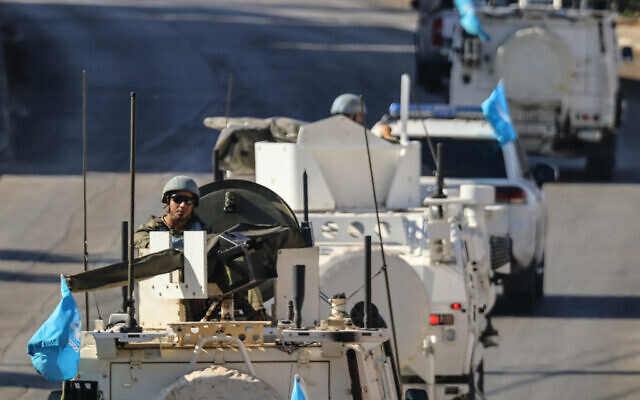Over the last week, the UN has reported that the Israeli military has fired on its peacekeepers, forcibly entered its base, halted logistics, and injured more than a dozen of its troops in southern Lebanon.
The international community has strongly condemned Israel’s attacks on the peacekeeping mission, which has been operating in Lebanon for over 45 years. UNIFIL, the UN peacekeeping mission in Lebanon, called the violations “shocking.”
Israel accuses Hezbollah of operating in areas near UNIFIL posts. On Sunday, Israeli Prime Minister Benjamin Netanyahu warned that UN peacekeeping forces in Lebanon are in “harm’s way.” He expressed regret that some UN peacekeepers had been injured over the past week and urged UN Secretary-General António Guterres to evacuate the peacekeepers “immediately.”
Guterres stated that attacks against peacekeepers “may constitute a war crime,” and that “UNIFIL and its premises must never be targeted.” The UN has stated that its troops will remain in Lebanon despite the attacks.
On Friday, two UNIFIL troops were injured when two explosions erupted near an observation tower. The IDF stated that it was responding to a “immediate threat” against it and had directed UNIFIL personnel to relocate.
Later Friday, a peacekeeper was shot in Naquora amid “military activity,” according to UNIFIL, which also reported that UN buildings in Ramyah had suffered “significant damage” as a result of explosions from nearby shelling.
On Saturday, UNIFIL reported that IDF soldiers halted a critical UNIFIL logistical movement near Meiss ej Jebel.
UNIFIL also accused the IDF of violating international law by backing its tanks into its Ramyah post, forcibly entering it, and requesting that the base turn off its lights. The IDF later stated that one of its tanks backed into the post while evacuating soldiers wounded by an anti-tank missile.
Several of Israel’s allies, including France and the United Kingdom, have condemned its actions, saying they are “appalled” by reports that Israel deliberately targeted UN bases last week.
What is UNIFIL?
The UN Security Council established the United Nations Interim Force in Lebanon (UNIFIL) following Israel’s initial invasion of southern Lebanon in 1978.
Its mandate was to confirm the withdrawal of Israeli forces from the country, restore international peace and security, and assist the Lebanese government in regaining effective authority in the region.
UNIFIL’s headquarters, which are located in the southern Lebanese town of Naqoura, are seen in 2020.
Israel invaded Lebanon for the second time in June 1982, establishing a security zone that remained in place until its withdrawal in 2000.
UNIFIL established the Blue Line in 2000, a 120-kilometer (75-mile) stretch of southern Lebanon that ensured Israeli forces’ complete withdrawal. It serves as a de facto border between the two countries because Lebanon and Israel have a border dispute.
The UNIFIL troops are tasked with monitoring border violations and keeping the area, which includes Hezbollah strongholds, secure.
While UNIFIL is a peacekeeping mission, troops may use force in certain circumstances, including self-defense, to protect civilians from imminent violence and to protect UN personnel, facilities, and equipment.
UNIFIL’s mandate is renewed annually by the UN Security Council at Lebanon’s request. The Security Council recently extended the mandate until August 31, 2025.
Who makes up UNIFIL?
The mission consists of over 10,000 people from 50 countries, the majority of whom are soldiers.
Indonesia, Italy, India, Nepal, Ghana, and Malaysia provide the most troops. Spain, China, Ireland, and France also have a significant presence. Some countries, including the United Kingdom, Peru, and Nigeria, contribute only one UNIFIL troop.
The peacekeepers are stationed in a 410-square-mile area between the Blue Line and the Litani River in south Lebanon. They hold 50 positions, with the UNIFIL headquarters located in Naqoura, southwest of the country.
